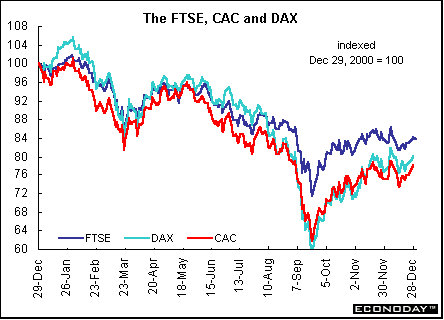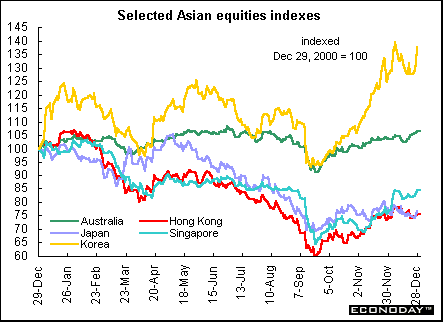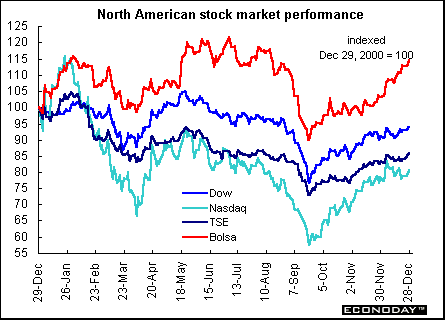
Europe and Britain
The London FTSE 100 was down 16.2 percent in 2001, its worst performance since calculations began in 1984. Despite this, the FTSE outperformed both the Paris CAC and Frankfurt DAX, which extended their slide that began in 2000. They were down 22 and 19.8 percent respectively on the year. All three indexes can point to weak technology, media and telecommunications stocks for their poor overall performances. The three indexes had been in a swoon prior to September 11 but quickly rallied along with other world indexes in its aftermath, still not enough to make up for losses suffered in the summer.

All three indexes began 2002 on the positive side, as technology stocks recovered some of their glamour - at least for the shortened trading week.
Asia
Two of the five Asian equities indexes followed here - Australia's all ordinaries and the South Korean Kospi - closed the year on the upside. Both the Japanese Nikkei and Hong Kong Hang Seng were down for a second year in a row. The Nikkei dropped 23.5 percent after losing over 27 percent in 2000, while the Hang Seng lost 24.5 percent after sliding 11 percent in 2000. The Singapore strait lost 15.7 percent on the year after dropping 22.3 percent in 2000. There was little surprise on why the Nikkei fell - investors were unwilling to invest in an economy that has foundered for about ten years and seems to be going from bad to worse. Currently in recession, little is being done to counteract the country's deflationary spiral, its soaring bankruptcy rate and the looming threat of bank failures. Virtually all Asian economies have felt the impact of the U.S. slowdown, which has translated into less demand for their products. These countries rely on exports, especially to the U.S., to keep their economies afloat.

Despite the holiday shortened week (Japanese markets were only open for an abbreviated session on Friday), all markets began the New Year on a positive note. Investors were particularly enthusiastic about chip stocks as chip prices are beginning to stabilize. Chipmakers are concentrated in Asia and are showing signs of recovery. This combined with positive economic news from the United States encouraged investors to buy equities.
Americas
The Mexican Bolsa out-performed the Dow, Toronto composite 300 and the Nasdaq in 2001. The Bolsa rebounded 12.7 percent on the year after losing 20.3 percent in 2000. The Nasdaq added to its woes by piling a 21 percent loss on top of a 39.3 percent loss in 2000. The TSE reversed direction and fell 13.9 percent after its climb in 2000 of 6.2 percent (it was the only index followed here that rose in 2000).

North American investors are choosing the high rode in 2002, at least so far, and all rose in the shortened trading week. Investors will begin concentrating in earnest this week and will be greeted by key economic data as well as early earnings season stirrings. The thing to focus on will be whether investors have in fact fully written off fourth quarter miseries and whether expectations hold for a medium term recovery.


Introduction • Global Stock Market Indexes • Recap of Global Markets • Currencies • Indicator Scoreboard

The Bottom Line • Looking Ahead
|